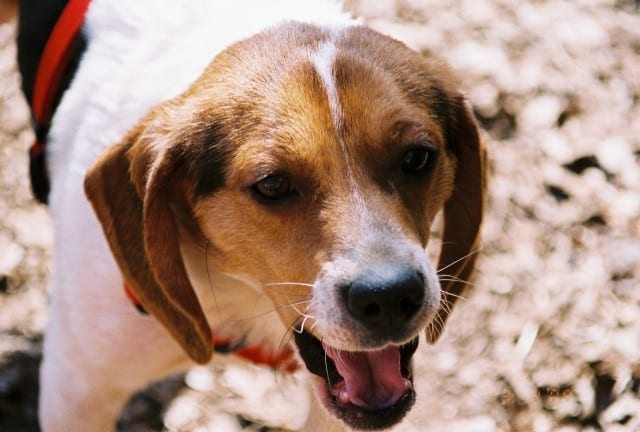
Are you giving the proper attention to your dog’s oral hygiene needs? The most common oral hygiene issue that dogs face is periodontal disease. Periodontal disease usually results from excessive plaque buildup. As plaque accumulates on the teeth, it gradually hardens into tartar. This adversely affects the tissues that surround and support the teeth.
The build up of plaque provides an perfect environment for bacterial growth. This bacteria results in irritation to the gums, causing them to swell and eventually bleed. As the inflammation worsens, additional bacteria are produced. This leads to the gums receding and the exposure of the root. Ultimately the teeth become loose in their sockets and they fall out if the disease is left untreated.
The symptoms of periodontal disease include reddened or bleeding gums, consistently bad breath, yellow or brown stains onthe teeth, and exposed tooth roots. Additionally, if your dog seems to have difficulty chewing, has excessive drooling, exhibits a reluctance to eat or displays mouth pain (as evidenced by rubbing his face on the ground or pawing at his mouth) the culprit may be periodontal disease.
Periodontal disease is quite painful and may result in tooth loss. However, the condition can cause additional, even more serious, health problems. The accumulation of bacteria may result in bacteria entering the blood steam. Once in the blood it can migrate to the urinary tract, heart valves, and other systems of the body. This chain reaction, starting innocently enough as a result of inadequate oral hygiene can ultimately lead to life-threatening complications.
While all breeds of dogs are at risk, periodontal disease is more commonly found in dogs with flat faces and short muzzles. Additionally, senior dogs are also at increased risk. Dogs whose diet is primarily moist, canned dog food are also more at risk than those who are usually fed dry dog food.
Treatment methods for periodontal disease depends upon the degree to which the disease has progressed. Brushing your dog’s teeth on a regular basis may resolve the problem. For more advanced cases the dogs teeth may require descaling. This usually requires sedating the dog under general anesthesia. If the disease has progressed to a very advanced stage, a specialist may have to be called in to perform advanced dental surgery.
As always, prevention and early detection are critical. Routine brushing of your dog’s teeth will help fight the buildup of plaque. In addition, regular visits to your veterinarian for a routine check-up can identify any hidden damage to the teeth before a problem grows more serious.
Help your dog maintain overall health by regularly providing veterinary check-ups, feeding him a healthy diet, routinely brushing your dog’s teeth, and giving him the occasional chew toy. He will certainly appreciate your efforts to keep him from getting “long in the tooth”.




